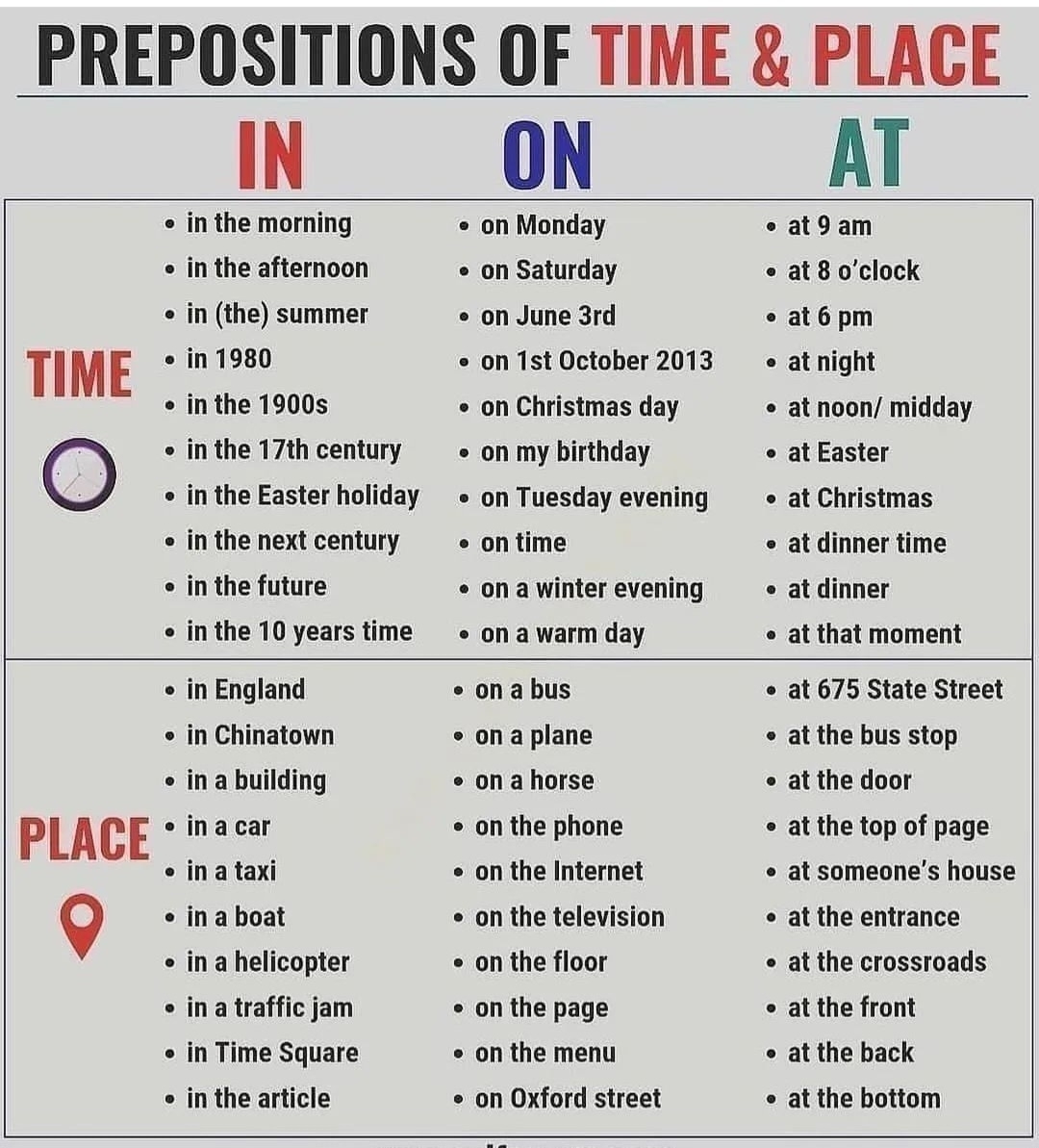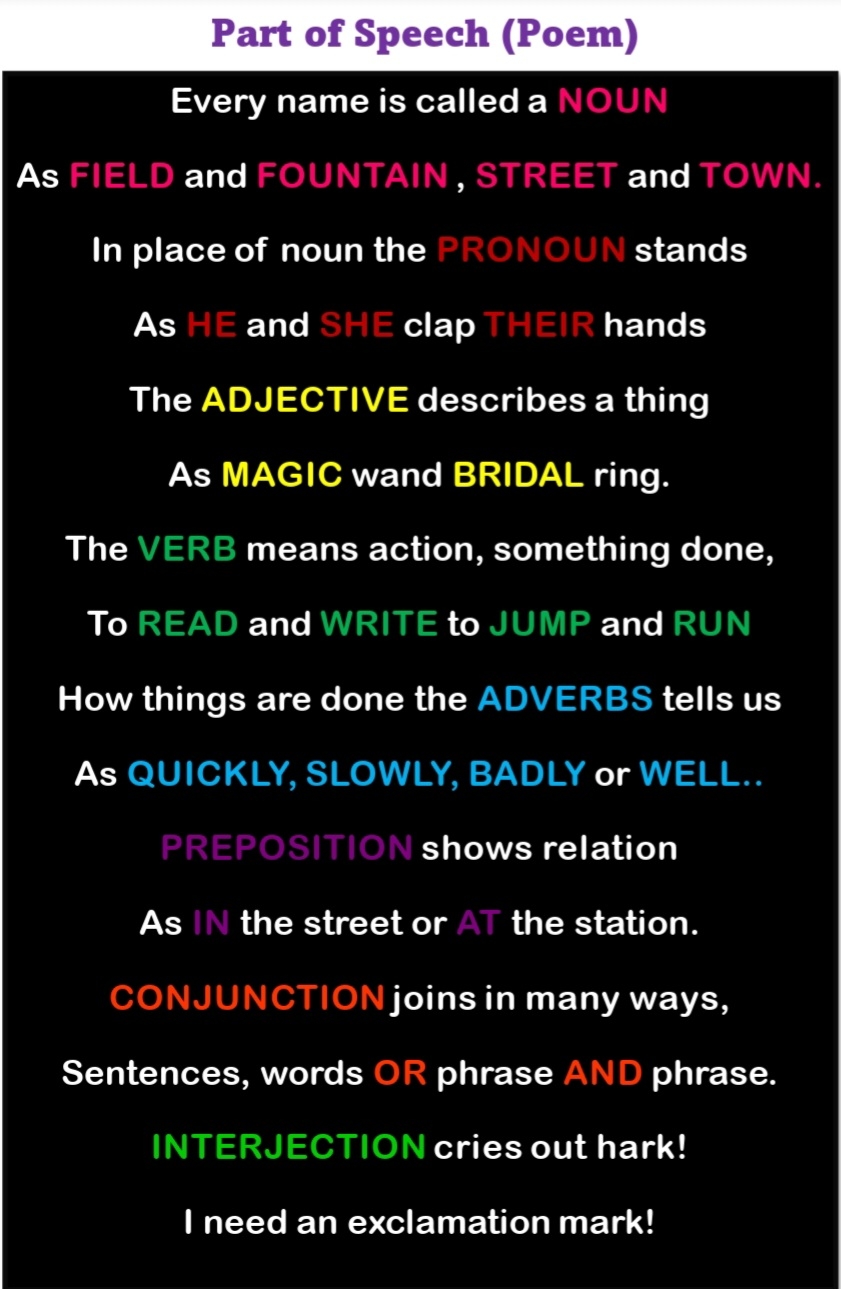Exclamatory sentence
Exclamatory sentence
Labels:
English Grammar
Related Words
RELATED WORDS
Kachhi-Wadekar M.S.(Educator, You tuber & blogger)
meghaswadekar@gmail.com
Labels:
Vocabulary
Pronoun सर्वनाम
Pronoun सर्वनाम
https://youtube.com/@meghawadekar
Pronoun have different types forms-
1) First Person Pronouns
2) Second Person Pronouns
3) Third Person Pronouns
4) Possessive Pronouns
5) Interrogative Pronouns
6) Demonstrative Pronouns
7) Indefinite Pronouns
8) Distributive Pronouns
9) Relative Pronouns
Labels:
English Grammar
Phrases
Kachhi -Wadekar M.S. (Educator, You Tuber & blogger)
https://youtube.com/@meghawadekar
http://kachhiwadekamadam.blogspot.com/2023/04/adjectives.html
Phrases
A group of words which makes complete sense is called Sentence.
ज्या शब्दसमुहातून पुर्ण अर्थबोध होतो त्यास वाक्य म्हणतात.
Eg. He played very well.
Phrase means : A group of words which makes sense , but not complete sense.
शब्द समूह ज्याने थोडाफार अर्थबोध होतो परंतु पुर्ण अर्थबोध होत नाही.
Phrases: A group of words, No subject verb combination, meaningless if used alone, but if used in a sentence has a unique meaning and enhance the beauty of language.
Eg. A lot of , to be fond of , one by one, to pay attention, to make fun of, to be fond of , to be engrossed in, to take care of, to look after etc.
Eg. 1) He was engrossed in a story book.
2) Rahul was engrossed in mobile.
3) Mother fond of all her children.
Notes-1) If the phrase start with ‘to’ then it is mostly verb phrase.
Eg. To take part , to make fun of . to get ready
Sentences- 1) He took part in the competition.
2) They are making fun of Raju.
3) I got ready for the function.
4) He is getting ready for function.
Note 2- If the phrase have ‘to be’ or ‘be‘ then use the ‘be forms of helping verbs’ and proper form of base verb. जर phrase मध्ये ‘to be’ or ‘be’ असेल तर phrase चा वाक्यात उपयोग करताना कर्त्याच्या लिंग वचन व काळानुसार योग्य त्या सहाय्यकारी क्रियापदाची रुपे वापरावीत.
'Helping verbs’ of to be
Present Tense – Am/ is/ are.
Eg. To proud of –
1)I am proud of my country.
2) We are proud of our country.
3) She is proud of her daughter.
Past Tense- was/ were :
‘to be able to’-
Eg.1) He was able to read properly.
2) They are able to converse with each other in English.
Future Tense – will be :
‘to be familiar with'.-
Eg. Very soon she will be familiar with everyone.
Phrases with sentences.
(1) to look for – चा शोध घेणे.
He was looking for his lost mobile.
(2) to look after – ची काळजी घेणे (March -2023)
We should look after our parents.
(3) to take care of – ची काळजी घेणे (Sept-2021)
We should take care of our health.
(4) to run away – पळून जाणे (March. 2020)
The thief ran away from jail.
(5) to be proud of – चा अभिमान असणे
I am proud of my country.
(6) to be afraid of – ची भिती वाटणे
Most of the people are afraid of ghosts and darkness.
(7) to be fond of – ची आवड असणे
He is fond of playing cricket.
(8) to be good at – च्यामध्ये तरबेज असणे
He is good at sports and games.
(9) to be eager to – उत्सुक असणे
The children are eager to see the circus.
(10) to be famous for – च्या साठी प्रसिद्ध असणे
Shivaji was famous for his bravery.
(11) to be unable to – असमर्थ असणे
He was unable to appear for the exam because of his illness.
(12) in front of – च्या समोर
My house is in front of my school.
(13) to get rid of – च्या पासून सुटका करणे
He got rid of the bad company.
(14) to be known as – ओळखले जाणे (March. 2020)
Dr. Abdul Kalam is known as Missile Man.
(15) in a flash – क्षणार्धात (in a moment)
It was done in a flash.
She collapsed in a flash.
(16) to be known for – च्यासाठी प्रसिद्ध असणे (be famous for)
Amitabh is known for his acting.
(17) to be engrossed in – च्यामध्ये व्यग्र/मग्न होणे/ च्यामध्ये दंग/मग्न असणे (to occupied in)
He was engrossed in the conversation with his friend.
(18) to muster up courage – धैर्य एकवटणे
I mustered up courage to fight with tiger.
(19) to belongs to – च्या मालकीचे असणे, चा घटक असणे
He belongs to the royal family.
(20) bring up – संगोपन करणे/पालन पोषण करणे
She has decided to bring up the orphan as her own child.
(21) to give up -सोडून देणे/त्याग करणे/थांबविणे (August-2022)
He gave up his bad habits.
(22) to be a part and parcel – अविभाज्य अंग/घटक असणे
It had become a part and parcel of their daily life.
(23) to root out – काढून टाकणे /मूळापासून काढून टाकणे
It is necessary to root out the evils from the society.
(24) to be able to – समर्थ असणे
Radha is able to speak English fluently.
(25) in search of – च्या शोधार्थ
He was in search of a new job.
(26) muster up courage – धैर्य एकवटणे
The young man could not muster up courage to climb the tree.
(27) to ponder over – च्यावर चिंतन करणे
The artist pondered over his idea for a long time.
(28) to ask for – मागणे /मागणी करणे (March. 2019)
He came into my office to ask for a loan.
(29) a lot of (July. 2019)
There is a lot of noise in the class.
(30) to show off – देखावा करणे/प्रदर्शन करणे (November -2020)
He likes to show off his knowledge.
Labels:
Vocabulary
Report Writing
Report writting is one of the writing skill which is an important for exam also it gives an opportunity to the students to show their writing skill.
For writing a News Report we need a format and in that format one can write ✍️ effectively.
Types of News
- Business News
- Fashion News
- Political News
- Sports News
- Crime News
- International News
Template for a News Report
- Headline (Title)
- Dateline (Day, Date, Place, Resource)
- Intro/ Leadline( Covering, Maximum 'WH' questios)
- Short Continuing Paragraph (details)
- Conclusion
Labels:
Writing Skill
Prepositions शब्दयोगी अव्यय
PREPOSITION IS A WORD USED WITH NOUN OR A PRONOUN TO SHOW THEIR RELATION WITH SOMETHING ELSE.
Eg. 1) Keep the book on the table.
2) The tiger is in the zoo.
Labels:
English Grammar
Parts of Speech (शब्दांच्या जाती)
1) NOUN नाम
2) Pronoun सर्वनाम
3)Verb क्रियापद
4) Adjective विशेषण
5) Adverb क्रियाविशेषण
6) Preposition शब्दयोगी अव्यय
7) Conjunction उभयान्वयी अव्यय
8) Interjection केवलप्रयोगी
9) Article उपपदे
Labels:
English Grammar
Parts of Speech (poem)
Parts of Speech (शब्दांचा जाती)
Every name is called a NOUN
As FIELD and FOUNTAIN , STREET and TOWN.
In place of noun the PRONOUN stands
As HE and SHE clap THEIR hands
The ADJECTIVE describes a thing
As MAGIC wand BRIDAL ring.
The VERB means action, something done,
To READ and WRITE to JUMP and RUN
How things are done the ADVERBS tells us
As QUICKLY, SLOWLY, BADLY or WELL..
PREPOSITION shows relation
As IN the street or AT the station.
CONJUNCTION joins in many ways,
Sentences, words OR phrase AND phrase.
INTERJECTION cries out hark!
I need an exclamation mark!
https://youtube.com/@meghawadekar
https://youtube.com/@meghawadekar
Labels:
English Grammar
Subscribe to:
Comments (Atom)
Related Words
Related Words . This is the language study activity which is important to increase Vocabulary of any Language. ...

-
Kachhi -Wadekar M.S. (Educator, You Tuber & blogger) https://youtube.com/@meghawadekar http://kachhiwadekamadam.blogspot.com/2023/04/adj...
-
Report writting is one of the writing skill which is an important for exam also it gives an opportunity to the students to show their writi...
-
RELATED WORDS Kachhi-Wadekar M.S.(Educator, You tuber & blogger) meghaswadekar@gmail.com https://youtube....













